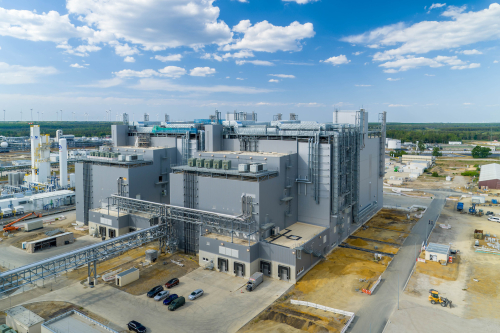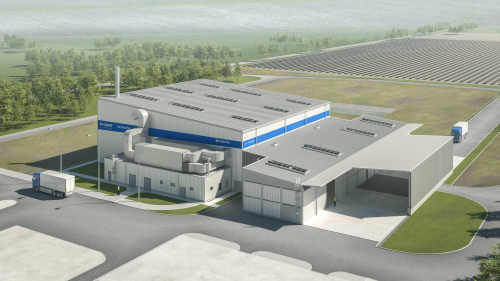The new plant is not only the first production facility for high-performance cathode active materials in Germany, but also the first fully automated large-scale cathode active materials production facility in Europe. The plant is fully sold out for the next years and will supply products tailored to the specific needs of cell manufacturers and automotive OEMs in Europe.

BASF CAM plant in Schwarzheide
BASF says that the carbon footprint of its innovative cathode active materials is significantly lower than the industry benchmark due to BASF’s proprietary efficient production technologies, which include minimized energy consumption and a high proportion of renewable energy.
In order to meet growing customer demand for the European electric vehicle market, BASF is already preparing additional investments for cathode active materials in Europe and is in advanced negotiations with customers. This underlines BASF’s commitment to establishing a robust, localized battery value chain in Europe.
With the combination of a state-of-the-art CAM manufacturing and a recycling facility, Germany gains a key piece of the puzzle for its growing battery ecosystem. BASF’s project increases our sovereignty along the value chain, promotes the circular economy and thus strengthens economic security. The decision in favor of Schwarzheide underscores the attractiveness of the site—its history and chemical knowhow as well as its abundance of renewable energy in the vicinity. The project also highlights the ongoing transformation: Here, where coal was long liquefied into gasoline, the active material for EV batteries will be produced from now on. We are happy to support this transformation with IPCEI funding.
—Dr. Robert Habeck, German Federal Minister for Economic Affairs and Climate Action

Rendering of BASF’s black mass plant
BASF already offers cathode active materials based on recycled metals as a closed-loop solution in Asia and North America to conserve resources and further reduce their CO2 footprint. With the investments in Schwarzheide, BASF is now directly supporting the European market and at the same time enabling faster growth for its global business.
End-of-life batteries and waste from battery production are mechanically processed in the new plant for black mass production. Black mass contains key metals used to make cathode active materials: lithium, nickel, cobalt and manganese.
In a second step, these valuable metals can be chemically recovered and used to produce new cathode active materials. Construction of a black mass production facility has already begun, and production is expected to start in 2024.
The two plants will expand the product portfolio at BASF’s Schwarzheide site and create a total of around 180 new jobs.
The investments reinforce BASF’s support of the European Commission’s agenda towards a European battery production value chain and is part of the “Important Project of Common European Interest (IPCEI)” approved by the European Commission on 9 December 2019, under the European Union State aid rules. The launch of innovative battery materials and research to develop next-generation battery materials and process development, including battery recycling, is funded by the Federal Ministry of Economic Affairs and Climate Action based on a resolution of the German Bundestag and by the Ministry of Economics, Labor and Energy of the State of Brandenburg based on a resolution of the Brandenburg State Parliament as part of the IPCEI for Batteries: Funding codes 16BZF101A/B.